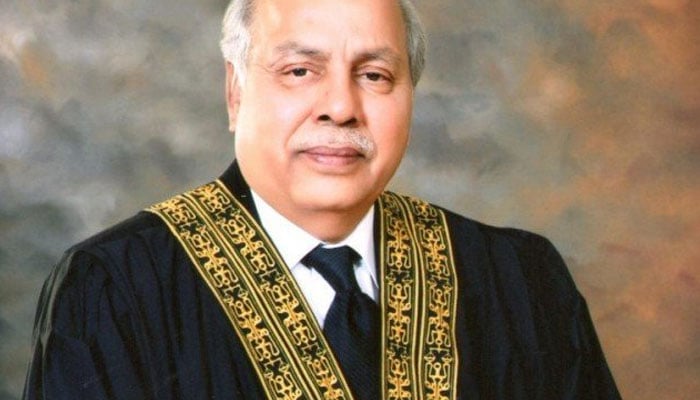Supreme Court has right to solve disputes among Federation, provinces: CJP
ISLAMABAD: The course participants of National Security and War-2021 on Thursday visited the Supreme Court (SC) of Pakistan. The main purpose of their visit to the Supreme Court of Pakistan was to get an orientation on the judicial system of Pakistan.
The visitors comprised faculty members of the National Defence University, officers of Pakistan Army, Pakistan Navy, Pakistan Air Force and Civil Service, including military officers from the friendly countries.
Chief Justice of Pakistan (CJP) Justice Gulzar Ahmed, while addressing the participants, briefed them about the judicial system in Pakistan as well as about the Supreme Court of Pakistan, the high courts of the provinces and the ICT, and other courts created by law.
The CJP said that the Supreme Court was also conferred by the Constitution, the original jurisdiction to adjudicate and determine disputes between two governments that was between the federal and a provincial governments or between two provincial governments. He said that he was given constitutional right to implement decisions.
He said, "As of now, I will deal with the subject of the Supreme Court, the high courts of the provinces and the ICT, and other courts created by law. The Chief Justice also briefed the participants about four-tier judicial system operating in Pakistan, both for ordinary civil and ordinary criminal cases.
The CJP threw light on the civil courts, court of district judge, the high court, which exercises revisional and appellate jurisdiction over the judgements, orders and decrees passed by the district judges and the Supreme Court, which is the final court of appeal against the judgements, orders and decrees passed by the high courts.
Likewise, the CJP also briefed the participants about the criminal courts, the court of Sessions Judge, the high court where revisions and appeals lie against the orders passed by the Session Judges and the Supreme Court of Pakistan, which is the final court in deciding criminal cases arising out of the orders passed by the high courts.
The Chief Justice also highlighted the role being played by Federal Shariat Court as well as special courts, saying that a large number of special courts and tribunals have been constituted under special laws having special jurisdiction to deal with cases involving the subject provided in the special law.
The Chief Justice said that among the special courts and tribunals that have been created by special laws, are the special courts of Banking, Labour, Customs, Taxation and Anti-Corruption, and the tribunals for Income Tax, Insurance, Service, and elections etc.
The CJP informed the participants that appeals from these special courts and tribunals lie directly to the high courts, except in the cases of service tribunals and election tribunals where the appeals directly lie to the Supreme Court.
Earlier, Major General, Inayat Hussain, Chief Instructor Armed Force War College called on Chief Justice of Pakistan Justice Gulzar Ahmed. During the meeting he extended thanks to Chief Justice of Pakistan for giving time for delegation and presented a shield to the Chief Justice on behalf of the course participants as token of remembrance. The CJP reciprocated the same by giving shield to the delegation.
-
 Inside Kate Middleton, Prince William’s Nightmare Facing Andrew Mountbatten-Windsor
Inside Kate Middleton, Prince William’s Nightmare Facing Andrew Mountbatten-Windsor -
 Margaret Qualley Shares Heartfelt Confession About Husband Jack Antonoff: 'My Person'
Margaret Qualley Shares Heartfelt Confession About Husband Jack Antonoff: 'My Person' -
 Savannah Guthrie Shares Sweet Childhood Video With Missing Mom Nancy: Watch
Savannah Guthrie Shares Sweet Childhood Video With Missing Mom Nancy: Watch -
 Over $1.5 Million Raised To Support Van Der Beek's Family
Over $1.5 Million Raised To Support Van Der Beek's Family -
 Diana Once Used Salad Dressing As A Weapon Against Charles: Inside Their Fight From A Staffers Eyes
Diana Once Used Salad Dressing As A Weapon Against Charles: Inside Their Fight From A Staffers Eyes -
 Paul Anthony Kelly Opens Up On 'nervousness' Of Playing JFK Jr.
Paul Anthony Kelly Opens Up On 'nervousness' Of Playing JFK Jr. -
 Video Of Brad Pitt, Tom Cruise 'fighting' Over Epstein Shocks Hollywood Fans
Video Of Brad Pitt, Tom Cruise 'fighting' Over Epstein Shocks Hollywood Fans -
 Jelly Roll's Wife Bunnie Xo Talks About His Huge Weight Loss
Jelly Roll's Wife Bunnie Xo Talks About His Huge Weight Loss -
 Margot Robbie Reveals Why She Clicked So Fast With Jacob Elordi
Margot Robbie Reveals Why She Clicked So Fast With Jacob Elordi -
 Piers Morgan Praised By Ukrainian President Over 'principled Stance' On Winter Olympics Controversy
Piers Morgan Praised By Ukrainian President Over 'principled Stance' On Winter Olympics Controversy -
 Halsey's Fiance Avan Jogia Shares Rare Update On Wedding Planning
Halsey's Fiance Avan Jogia Shares Rare Update On Wedding Planning -
 Instagram Head Adam Mosseri Says Users Cannot Be Clinically Addicted To App
Instagram Head Adam Mosseri Says Users Cannot Be Clinically Addicted To App -
 James Van Der Beek Was Working On THIS Secret Project Before Death
James Van Der Beek Was Working On THIS Secret Project Before Death -
 Las Vegas Father Shoots Daughter's Boyfriend, Then Calls Police Himself
Las Vegas Father Shoots Daughter's Boyfriend, Then Calls Police Himself -
 'Hunger Games' Star Jena Malone Shocks Fans With Huge Announcement
'Hunger Games' Star Jena Malone Shocks Fans With Huge Announcement -
 Ex-OpenAI Researcher Quits Over ChatGPT Ads
Ex-OpenAI Researcher Quits Over ChatGPT Ads




